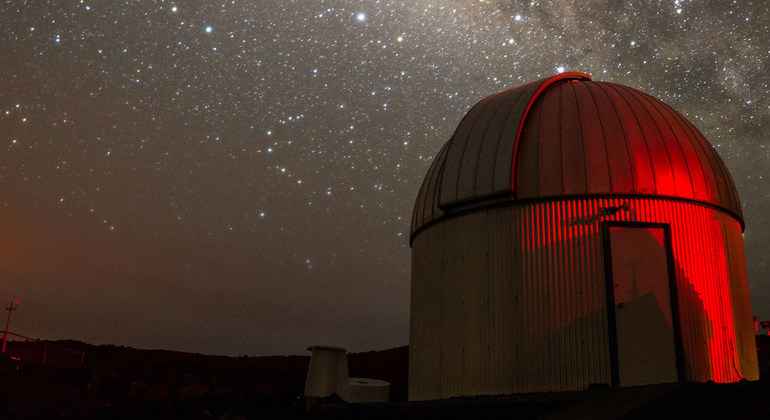Professor John Tonry leads the NASA-funded ATLAS (Asteroid Terrestrial-impact Last Alert System) project which bills itself as “Earth’s Last Defence.” He works alongside postdoctoral researcher Ari Heinz.
Their work could play an important role in the global debate about climate change and, as a result, contribute to realizing some of the 17 goals Sustainable Development Goals agreed by the global community to reduce poverty and create a sustainable planet.
UN News joined the International Labour Organization on a visit to Hawaii to meet the two astronomers ahead of International Asteroid Day marked annually on 30 June.
John Tonry: I really like big questions; like, where did the universe come from and where is it going? One way to continue answering those types of questions was to create this asteroid survey. Our job is to track asteroid hazards and calculate if and when they will hit Earth. We have the technology to measure these events beautifully. The chances of being hit by an asteroid in the next year is very small, but in the next 100 years, it’s not so small and that could result in many deaths. So, we see an asteroid strike as a low probability but high consequence event.
Ari Heinz: While most of our surveys focus on larger asteroids that we can see decades, or even a century, before they hit Earth, ATLAS focuses on smaller asteroids, which wouldn’t cause global devastation, but which could destroy a city, and which we can only detect when they are close to Earth. If ATLAS discovers that kind of asteroid, then we would treat it like, for example, a hurricane and advise a city or state to evacuate, because there’s going to be a big explosion there.
JT: 20 years ago, we couldn’t purchase the computers we use nowadays, as they were hopelessly expensive. The cameras and telescopes that we’re building now simply weren’t possible even 10 years ago, and we have developed the software to match the hardware capabilities.
AH: The threat of asteroids although small, certainly motivates me to be careful and try not to miss anything. There’s a strange paradox here. We’re sort of laid back in the asteroid community, we’re trying hard but we’re not under a lot of stress in general, but then we understand that at any moment, we could suddenly be some of the most important people in the world for a short amount of time.
JT: Astronomy can play an important role in understanding climate change. It’s possible that the sun actually goes through century-long cycles: it’s crucial to understand how the sun behaves, and we have just built a new telescope to look at its surface.
The understanding of planetary atmospheres tells us an awful lot about how climate change can actually run away. John Tonry, Astronomer, ATLAS
We can learn from other planets in the solar system where climate change went seriously wrong. Venus was driven to extreme heat by its atmosphere while Mars went the other way and cooled down and now needs a warming atmosphere. So, the understanding of planetary atmospheres tells us an awful lot about how climate change can actually run away.
AH: In terms of the future, I see a lot of exciting developments with new telescopes being built and new space missions being launched. There are areas where we can certainly make huge strides forward, for example, asteroids and solar system exploration.
Then there are big questions that are extremely interesting, but may be completely intractable. We have been trying to figure out what dark matter is for 50 years now. We might find out tomorrow, but it’s also possible that we’ll never find out what it is.
JT: Astronomers are in a good position to correct misconceptions about whether climate change is happening or not. The simple answer is “yes,” and that’s what I told my students 30 years ago. The only questions are really, how severe it will be, and how much it will cost to put right. The most important thing for the human race right now is that we absolutely need to deal with it. I think astronomers understand all of this very clearly, and we can also explain it pretty clearly.




